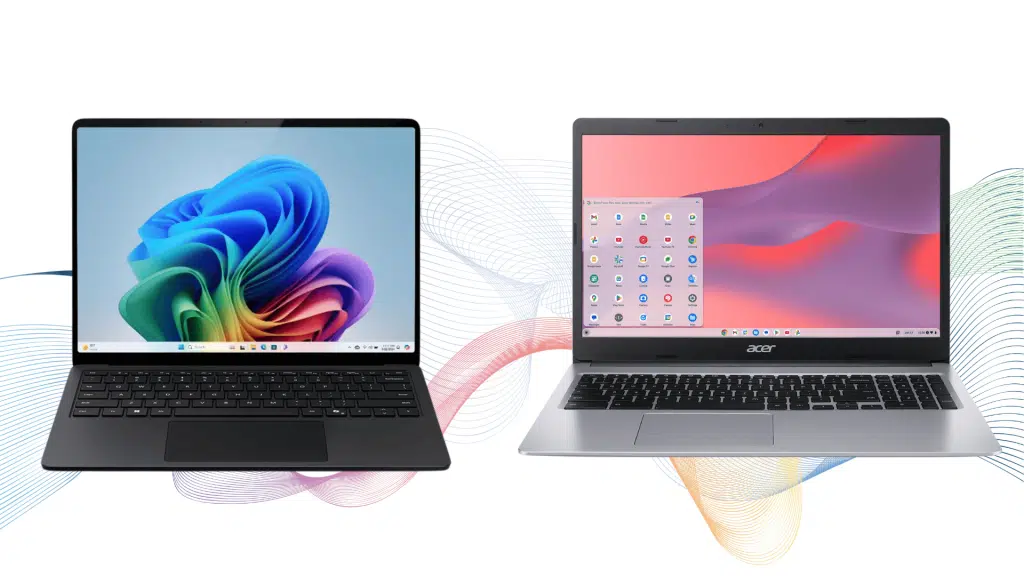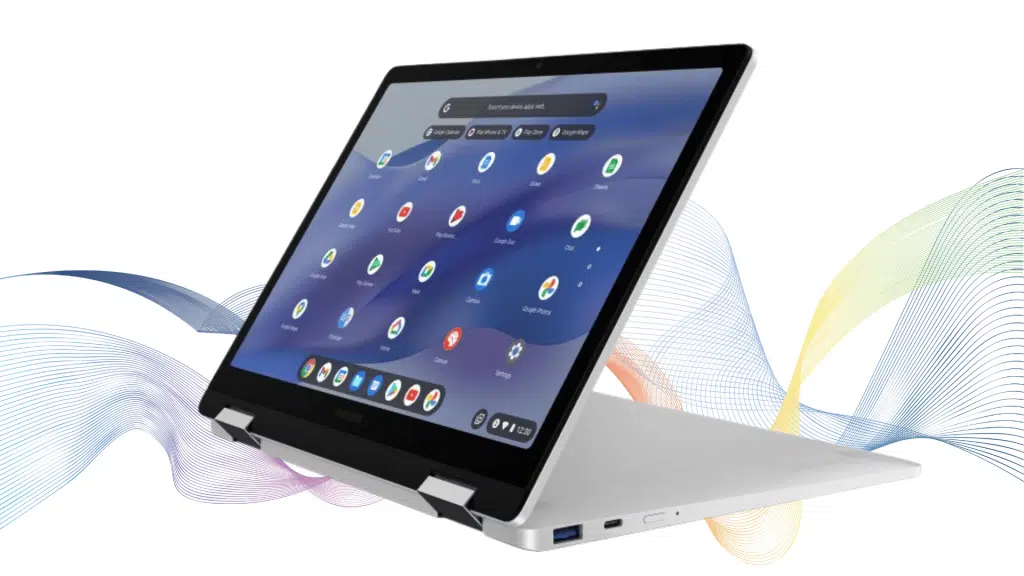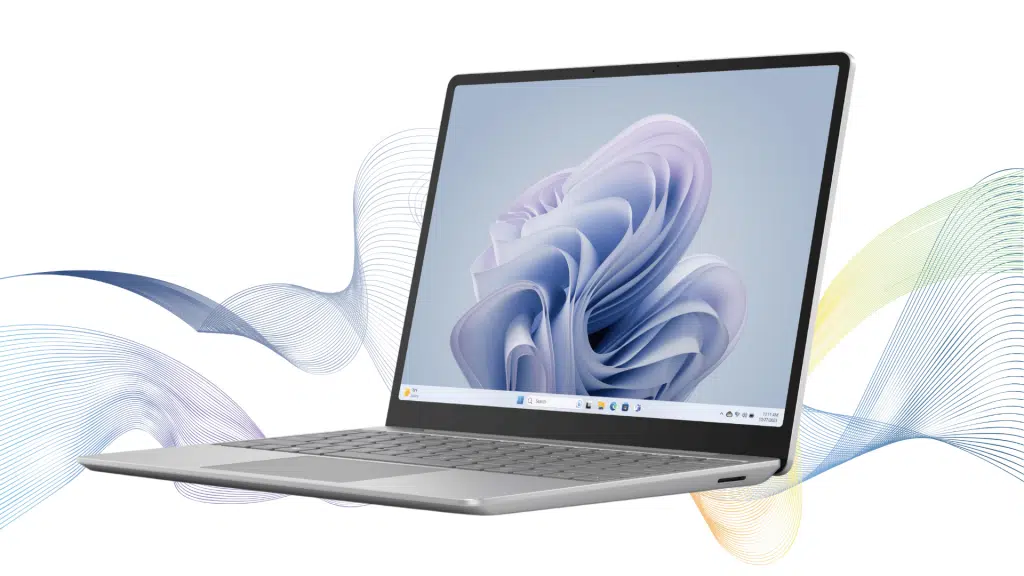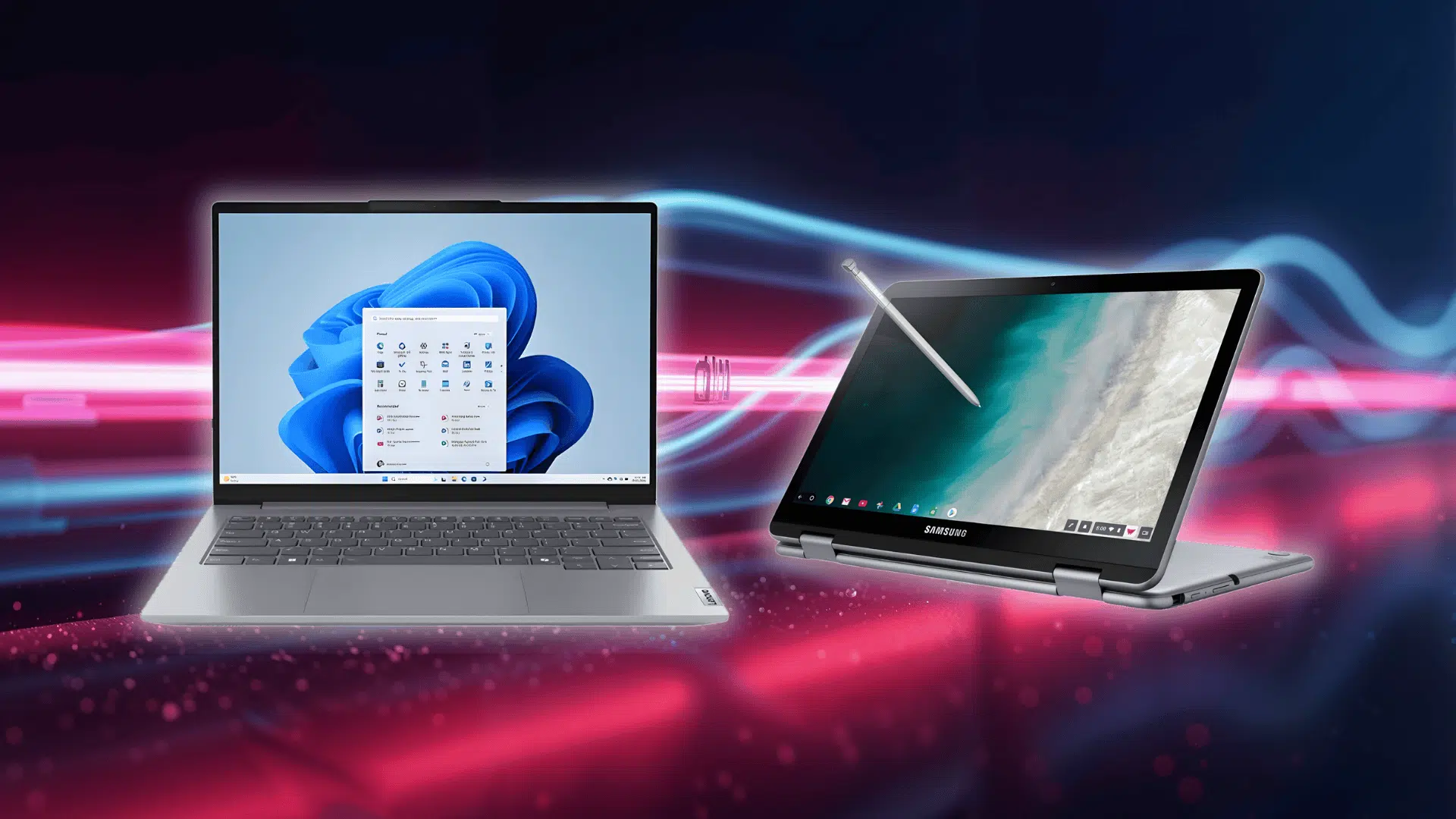Deciding between a laptop and a Chromebook isn’t always simple- both promise convenience, yet serve completely different needs.
I’ve been there too, comparing specs and thinking which one actually fits my daily routine better.
In this blog, you’ll get a clear, side-by-side look at both devices without the tech overwhelm.
I’ll walk you through how they differ in performance, software, price, and usability so you can make a smart choice that feels right for your lifestyle.
Once you’ve read through, you’ll have a clear idea of which one truly deserves a spot on your desk.
A Quick Overview of Chromebooks and Laptops
A Chromebook is a cloud-based device that runs on Chrome OS, designed for simplicity, security, and web-based tasks like browsing, streaming, and online document work.
It’s lightweight and easy to maintain, making it ideal for students or casual users.
A laptop, on the other hand, runs on Windows or macOS and supports heavy software, gaming, and offline use.
It offers more flexibility and power but typically comes with a higher price tag and requires more upkeep.
Laptop vs. Chromebook: Key Differences


Laptops and Chromebooks both handle basic computing but differ in how they run, perform, and manage tasks.
1. Operating System
Laptops run on Windows or macOS, giving users flexibility and full control. You can install programs, adjust settings, and multitask with demanding apps—making them ideal for professionals, gamers, and creators.
The interface is familiar and stable, suited for both work and personal use, handling heavy workloads even offline.
Chromebooks use Chrome OS, a lightweight system built around the Chrome browser. It’s fast, secure, and easy to learn for everyday tasks like browsing or streaming.
While mostly cloud-based, Chrome OS now supports Android and Linux apps for added flexibility without slowing performance.
2. Software Access
Laptops can run everything from Microsoft Office and Adobe Creative Cloud to advanced tools for design, coding, and editing.
They’re ideal for students, professionals, and creators who rely on offline software and need strong performance for multitasking.
Because they handle multiple programs smoothly, laptops are the better choice for users who need flexibility and power.
Chromebooks run web-based and Android apps like Google Docs, Sheets, and Zoom, but can’t handle most Windows or macOS software.
They’re best for lightweight work, cloud collaboration, and simple, browser-based computing that stays synced across devices.
3. Performance
Laptop performance depends on the model and specs. High-end ones have powerful processors, graphics, and memory for gaming or design work, while mid-range models handle multitasking and office tasks easily.
You can choose configurations to match your workload and budget, making laptops great for users who need consistent speed and power.
Chromebooks focus on speed and simplicity. They boot fast, run smoothly, and handle browsing, streaming, and documents well.
Though not built for gaming or heavy creative work, their cloud-based system stays responsive and energy-efficient for everyday online use.
4. Storage & Cloud
Most laptops include large internal storage, usually between 256GB and 1TB. You can save programs, photos, and videos locally, making offline work convenient.
They also support external drives and SD cards, offering flexibility for users handling large files or projects requiring frequent offline access.
Chromebooks typically have 64GB to 128GB of storage, relying on Google Drive for cloud-based data. This keeps them light, fast, and secure, with some apps offering offline access.
They’re ideal for users who prefer cloud storage and want access from multiple devices without worrying about space or file management.
5. Security & Maintenance
Laptops offer flexibility but need regular maintenance. Users must manage antivirus software, updates, and backups manually.
Skipping these can slow performance or cause security risks, but laptops allow more system control, which tech-savvy users value.
With proper care, they stay secure and efficient for years, though they need more attention than other systems.
Chromebooks handle security automatically with built-in protection, background updates, and sandboxing.
Because they rely on web apps, they’re less vulnerable to malware—making them low-maintenance and ideal for users who want a safe, simple device without manual management.
6. Price and Value for Money
Laptops cover a wide price range, from budget models at about $500 to premium systems above $2,000. Higher-end models provide stronger performance, better displays, and longer lifespan.
They deliver good long-term value for professionals and users who rely on demanding software. The extra cost is justified by the versatility, durability, and power of laptops, making them a solid investment for users who need a complete, performance-driven machine.
Chromebooks are affordable, typically priced between $200 and $600. They offer solid performance for browsing, online learning, and remote work without high costs.
Despite being cheaper, they deliver long battery life and quick operation. Their value lies in simplicity, security, and low maintenance.
For users focused on everyday tasks and affordability, a Chromebook provides dependable performance without the expense or complexity of a traditional laptop
Chromebook Advantages and Limitations


Chromebooks offer several benefits but also have a few drawbacks. The points below outline where they perform well and where they fall short, so you can judge if they fit your needs.
| Advantages | Limitations |
|---|---|
| Price: Usually more affordable than most laptops, offering excellent value for everyday use. | Offline Use: Many apps and services require an internet connection to work fully. |
| Portability: Lightweight and easy to carry, making them ideal for students or travelers. | Software Support: Can’t run advanced programs like Adobe Premiere or full Microsoft Office. |
| Battery Life: Lasts around 10–12 hours per charge, perfect for a full day’s work. | Storage Space: Limited internal storage; relies mainly on Google Drive. |
| Simplicity: Chrome OS is easy to use, quick to start, and stays clutter-free. | Gaming and Power Tasks: Not built for high-end gaming or heavy creative work. |
| Security: Built-in virus protection and automatic updates keep it safe. | Peripheral Compatibility: Some accessories or specialized software may not work with Chrome OS. |
New Updates
Chromebooks now support Android and Linux apps, letting users install mobile and development tools directly.
This update adds flexibility and narrows the gap between Chromebooks and traditional laptops while keeping the same speed, security, and ease of use.
Overall, Chromebooks continue to improve each year, offering a balanced mix of simplicity and modern capability. They’re now a stronger option for everyday users who value affordability, reliability, and ease of use.
Laptop Advantages and Limitations


Laptops combine performance and versatility, making them useful for many types of users. The sections below outline their main benefits and drawbacks to help you evaluate their overall value.
| Advantages | Limitations |
|---|---|
| Software Flexibility: Can run full desktop programs like Microsoft Office, Adobe Creative Cloud, and design or coding tools. | Price: High-end models can be costly, especially for gaming or creative work. |
| Performance: Handles demanding tasks such as gaming, editing, and multitasking with powerful processors and ample RAM. | Maintenance: Needs manual updates, software management, and occasional repairs to maintain performance. |
| Offline Use: Works efficiently without an internet connection, making it great for travel or remote work. | Security Risks: More vulnerable to malware and viruses, requiring antivirus protection. |
| Compatibility: Supports a wide range of peripherals, accessories, and third-party software. | Battery Life: Powerful hardware tends to drain the battery faster than lighter devices. |
| Customization: Users can upgrade components like storage or memory to boost performance. | Weight and Heat: Can be heavier and generate more heat during extended use. |
New Updates
Modern laptops now feature Windows 11, ARM-based processors, and AI tools that boost speed, efficiency, and battery life.
These upgrades make them faster, lighter, and more capable while maintaining full desktop performance in portable designs.
Overall, laptops remain the best choice for users who need power, flexibility, and full software support. With newer updates, they continue to deliver reliable performance for both work and entertainment.
Which One Should You Choose?
So, when you ask what a Chromebook is vs a laptop for your use case and which one suits your needs, here’s a simple breakdown to help you decide which option fits your lifestyle best:
Choose a Chromebook If
Need a budget-friendly, lightweight device for web browsing, online classes, or media streaming. Chromebooks are ideal for users who spend most of their time online, using tools like Google Docs or YouTube.
They’re perfect for students, travelers, and casual users who want reliable performance without complex setup or high costs.
Choose a Laptop If
Need powerful performance and full software support for work, gaming, or creative projects. Laptops are the better choice for professionals, designers, and gamers who rely on demanding applications or need offline access.
They offer more flexibility, stronger hardware, and a familiar environment for multitasking and productivity.
In the end, your choice comes down to purpose and priority. If you value simplicity and price, go for a Chromebook; if you need power and flexibility, a laptop is the better fit.
Top Chromebook and Laptop Recommendations
The models below are among the best-reviewed options. These examples cover a range of prices, features, and user types to help you pick what suits your needs.
Chromebook
Chromebooks are ideal for users who want affordable, reliable, and easy-to-use devices for web-based tasks. The options below offer great performance, portability, and long battery life for everyday needs:
- Asus Chromebook Plus CX34: Balanced performance and durability, perfect for students and remote workers.
- Lenovo Chromebook Duet 5: Lightweight 2-in-1 design ideal for travel, reading, and streaming.
- Acer Chromebook Plus Spin 714: Convertible build with touchscreen flexibility for productivity or entertainment.
- HP Chromebook x360: Great battery life and smooth multitasking for online work and learning.
- Acer Chromebook Plus 514: Reliable mid-range choice with strong performance for everyday use.
Laptop
Laptops are better suited for users who need more power, storage, and versatility for demanding work or creative projects. The models listed here deliver strong performance, durable design, and long-term value:
- Apple MacBook Air (M4): Exceptional battery life, slim design, and powerful chip for professionals on the go.
- Dell XPS 13: Premium ultrabook with excellent build quality, display, and performance balance.
- HP Spectre x360: 2-in-1 flexibility with solid power, ideal for multitasking and creative work.
- Lenovo Yoga 9i: Strong all-around performer with touchscreen and convertible features.
- Acer Swift X: Affordable option for students and professionals needing good performance at a fair price.
Final Thoughts
Choosing between a laptop and a Chromebook depends on how you plan to use it.
If you need a powerful system for work, gaming, or creative projects, a laptop gives you the performance and flexibility to handle anything.
But if you prefer something light, affordable, and simple for browsing, studying, or everyday online use, a Chromebook is a great choice.
Both are reliable in their own way- it just comes down to your priorities. Think about what matters most to you: power or simplicity, offline use or cloud access. Once you know that, picking the right one becomes easy.
Still unsure? Start by listing your daily needs, and you’ll quickly see which device fits your life best.







